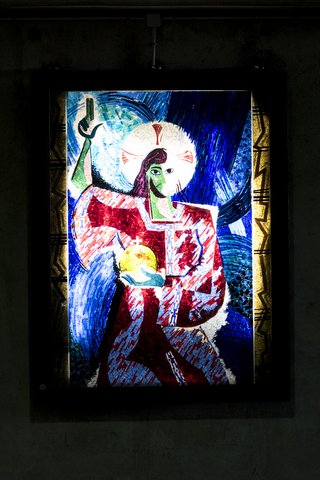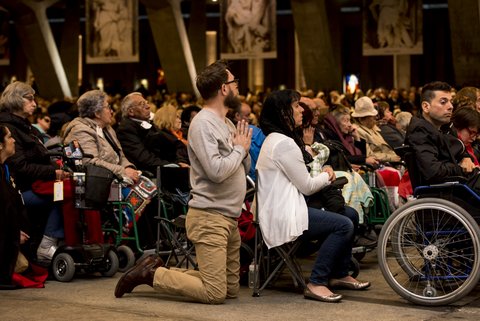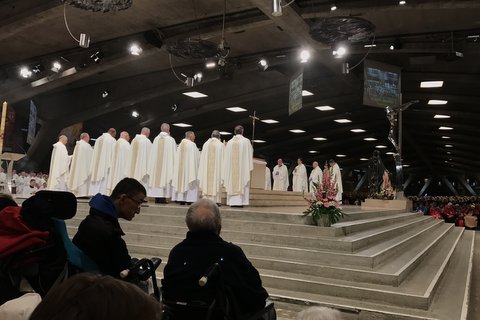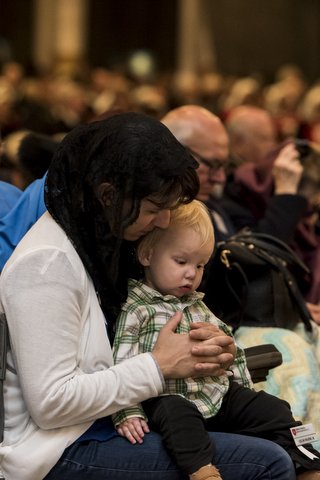
One, holy, catholic, apostolic
This is part of a series about our 2017 pilgrimage to Lourdes with the Order of Malta American Association. You may want to start with the first post, or see all the posts about our family’s Lourdes pilgrimage(s) in reverse chronological order.
Our Sunday Mass in Lourdes was held in the the Basilica of St Pius X. This church was constructed for the centennial of the Lourdes apparitions, in the late 1950s, to accommodate the expected influx of pilgrims. For some reason I cannot ascertain, it was built almost entirely underground.

Green glowing plastic Jesus. Why, why?
Our procession from the hotel that day led us to a concrete tunnel lined with glowing art in plastic frames. It felt exactly like descending into a bunker (so I imagine — I read a lot of dystopian fiction). Lines of pilgrims from every corner of the town were converging into a few massive streams. We were being packed in like sardines; my palms actually began sweating. My heart was not exactly drawn heavenward by the long, blind downhill walk.
As we exited the tunnel, immediately to our right, the priests who would concelebrate Mass were congregating. Let me attempt to put that in perspective: Every Malta association in the world that was able to do so sent a delegation to Lourdes that weekend. And in that corner, every deacon, priest, bishop and cardinal that had traveled with any of them was standing idly in his Easter vestments. I think my eyes actually bugged out of my head. I’m terrible with crowd estimates, but I could safely guess that there were several hundred clergy members milling around waiting for Mass to start.

Waiting clergy, in a corner plucked from the set of an outlying district in The Hunger Games (amiright?)
I looked left and tried to take in the basilica space. What had seemed a dirty concrete hole on approach was, somehow, embracing and sturdy. Still ugly, but comforting in the way that someone’s ugly, sweet grandmother or lived-in basement might be comforting. Giant concrete ribs lined the entire ceiling from one end to the other, covering an area that could easily contain several football fields. The air was chilly, but the artificial light seemed warm.
We were trying to stay connected to the procession of our American Association, but foot traffic was heavy and Europeans have no shame about cutting through lines, even lines of Malade-bearing voitures. A member of the Hospitalite, or Lourdes volunteers, came over and tried to pull us out of line with Oscar’s stroller to bring us somewhere else, alone into the vast expanse of people. Kim indicated (strongly) that we would stay with our group. He left, clearly annoyed. 20 yards later, someone else tried again, with the same disappointing result. I was feeling a little anxious because our line was far in the back of the basilica, about as far from the altar as you could get. I had no idea where the American group was heading, but I was pretty sure these men were trying to put Oscar with other children, and I kind of liked the idea of having that solidarity. Besides, what if the Americans had crappy seats and the children had better ones? (Americans in Lourdes, as in most of Europe, are tolerated but not much loved.) I sighed, and we stuck with Kim.
Our line was moving like molasses, though, and finally even Kim became concerned that we would be stuck with Oscar’s stroller in the middle of a long, immovable line of voitures, unable to leave if he became fussy. At this point, she took matters into her own hands and began to march us up the long aisle toward the altar in the center of the basilica. She was intercepted by a Hospitalite, who led us the rest of the way, depositing us conveniently at the end of the very first row, where we said goodbye to Kim and were left to ourselves.

Maybe one quarter of the people in attendance. The sea of white beneath the screen is all the clergy. (Photo: Michelle Babyak)
Over time, as more Malades filled in, we ended up in the second row instead of the first, but we were only about 20 feet from the altar. I couldn’t believe our luck, especially after I turned around. The sea of bodies behind us seemed absolutely endless. I couldn’t see a single one of the white-robed priests we had walked past on our way in. On the other side of the altar, across from us, the view was the same.
Our neighbors were all wheelchair-bound, non-English-speaking, and delighted to see a baby in their midst. (I said more than once during the week that Oscar’s pilgrimage was to spread joy everywhere he went.) They turned to crane their heads and smile at him, cooing sweet baby nothings in their many languages.

Not an American in sight except those three in the middle (Photo: Michelle Babyak)
Eventually, the Mass itself began, and the air of pageantry was breathtaking. The organ notes thundered and echoed in the enormous space. The processional hymn was a repetitive, hypnotic shout of praise, its chorus resounding every thirty seconds: “All the earth, sing with joy to the Lord, Alleluia!” We only heard it in English a handful of times. Nearly every repetition was in a new language, a dizzying array of sounds blending together, but always the meaning was the same. A tremendous line of flags, each flag representing a different Malta Association present at the pilgrimage, made its way up the center aisle and marched to the right, passing in front of us.
Then the deacons and priests began to process. And process. And process. They walked in pairs and proceeded up the few steps to the altar, bent to kiss it, and streamed around both sides and over to their seats on the left. (I laughed to see a priest standing at the top of the steps directing them. So many priests, the altar needed crowd control!) When it seemed like they had been at this for several minutes, I turned my head to look back down the aisle, and I still could not make out the end of the line. In their flowing white robes, amid the riotous singing, it made me think of an endless procession of angels and saints walking to the throne of God and casting their crowns at his feet. Somehow all the noise and light and motion was meditative.
Finally the last priests stepped up, and I turned again. Next, at last, were the bishops and cardinals. Even their line stretched for the entire length of the basilica, from the center to the outermost edge. I was awed at the depth of the “bench,” so to speak. I was suddenly certain that here was a depth against which the gates of hell could never prevail.

Standing room only for bishops, archbishops and cardinals during the consecration
I used to call the great hall in Prague Castle the “Lung Room” because the very walls seemed as if they were about to begin breathing. I had a notion to call this underground basilica the “Womb Room”: once Mass began, it felt as if we were being cradled inside the ribs of the Blessed Mother herself. The weird starkness of the architecture and was set alive by the beauty and joy of the music. Its barrenness was juxtaposed against the endless depth of faith evidenced in the endless depth of the people. It was barren, until it was filled with her children, and then it was gloriously fruitful.
As the Mass continued, this sense of might and universality only increased. While this is probably the same feeling one might get out of a Mass in other places in Christendom—St Peter’s Basilica in Rome, for example—here it happened despite the bleak surroundings, without the benefit of eye-catching stained glass or marble floors. We prayed in Latin not out of fancy piety but out of common necessity: it was the shared mother tongue of our shared faith. Flags, capes, Latin, incense, and pageantry notwithstanding, Mass was stripped down to its essence. No one was there to enjoy the view. Everyone was there because that is where Jesus was. We had traveled across the world because we needed Him, and if He was going to show up at Mass in a hole, so were we.
And there was another added dimension. The altar is in the center of the underground basilica. Surrounding the altar on three sides were the sick, the lame, the blind, the cancerous, the downtrodden and dispossessed. They came in voitures, in wheelchairs, on stretchers. The places of highest honor were reserved for the least of the brethren.

Anywhere else, such a sorry display of the frailty of human flesh might have seemed, well, sorry. But that frailty, united to each other and to Christ, had unfathomable power. It did not mar the grand pageantry of the Mass; it elevated it to something even more beautiful and sacred.
The fact that the basilica was “in the round,” all seats facing the high altar in the center, made perfect sense. Malades walked, rolled, would have crawled to get there. Some, like the pilgrims from Iraq, clawed and fought their way there out of the mouth of hell itself. From all corners of the world, the broken came together as one body to surround and lift up the Eucharist, the source and summit of our faith.
Once again, something that began almost as a slapstick comedy—Follow me down into this filthy hole! Priests go left! Flags right! Follow the jumbotron! —culminated in the revelation of a chief truth of the faith. Every Sunday at Mass, I recite in the creed the words “one, holy, catholic, and apostolic” in reference to the church. Never before had I understood the unassailable truth of those words.

Photo: Michelle Babyak
One: one shepherd, one flock.
Holy: unwavering in its devotion to our God made Man.
Catholic: here meaning universal, not just in language and culture but in bodily form and function.
Apostolic: formed in the womb of Mary, to be reborn in Christ’s image, to set forth into the world as evangelists in His name.
Here was the church as the Body of Christ made manifest. Here were the suffering held closest to His Sacred Heart in the flesh.
Want more of the story? Read my other Lourdes 2017 posts here:

Wow. Just. Wow.
This quote ” I had a notion to call this underground basilica the “Womb Room”: once Mass began, it felt as if we were being cradled inside the ribs of the Blessed Mother herself” gave me chills.
Thank you for continuing to share!
These are wonderful posts, Christy. Do you mind if I share?
Please, share away! It’s a little baby blog right now, but I would love for EVERYONE to know about Lourdes and the Order of Malta.
Oh!!! This is beautiful and so compelling! Love this: “No one was there to enjoy the view. Everyone was there because that is where Jesus was. We had traveled across the world because we needed Him, and if He was going to show up at Mass in a hole, so were we.” Amen and thank you! Can’t wait to read more!
Brought me to tears. Your writing is a gift.